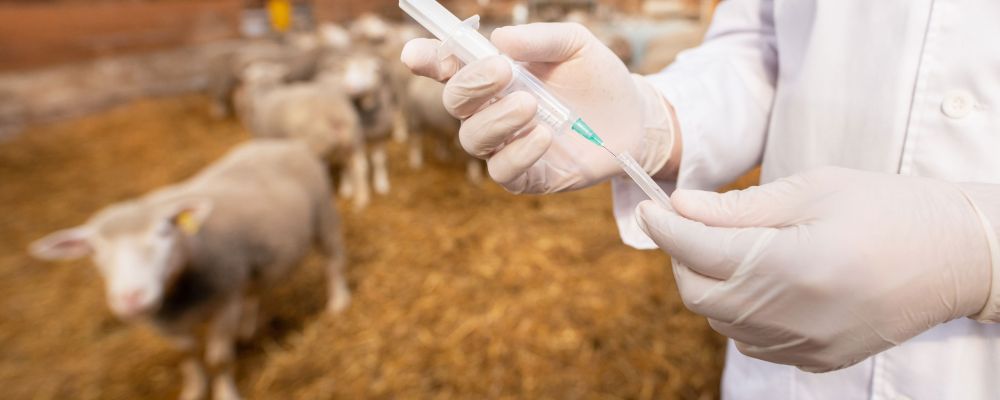- The ANMV
- Our activities
- Administrative formalities
- Our Publications
- Europe & International
- Europe
- International
- World Organisation for Animal Health (WOAH)
- International harmonisation of technical requirements for the registration of veterinary medicinal products (VICH)
- Pharmaceutical inspection cooperation scheme (PICs)
- Organisation for Economic Co-operation and Development (OECD)
- Codex Alimentarius
- Cooperation agreements
- E-learning module
Portal Veterinary medicinal products


Avian influenza: chickens cannot be vaccinated this winter
The conditions are not currently in place to effectively vaccinate chickens and turkeys against avian influenza. In order for this strategy to be feasible for the coming years, it will be necessary to increase production of the vaccines already available, develop vaccines for all poultry species, including ducks, and authorise these vaccines in France or in Europe.
France has experienced several major outbreaks of avian influenza in recent years. The one in 2021-2022 was particularly severe, leading to the culling of over 21 million poultry. These outbreaks require that preventive strategies be reviewed, including the possible vaccination of poultry at European level to supplement other preventive measures. However, such vaccination will not be feasible in France this winter. Several factors preventing it from being implemented were identified in the expert appraisal carried out by ANSES. The Agency's work focused mainly on chickens (Gallus gallus), which are the only species for which a vaccine is currently authorised in Europe.
Too few vaccines are readily available
Of the five vaccines currently available worldwide, only one has a marketing authorisation in Europe for chickens. However, this authorisation dates back to 2006 and the vaccine strain on which it is based has not been updated since then. Its efficacy against the strains currently circulating is therefore uncertain. Moreover, given the low stocks available for all the vaccines currently on the market, it would take several months to produce enough doses to vaccinate poultry at farm level. Indeed, most of the avian influenza vaccines produced worldwide are used by countries where the disease has become firmly established. Within the European Union, vaccination against avian influenza is currently only authorised to preserve rare species kept in zoos, which means that the number of vaccines potentially available is not sufficient for farms.
No effective vaccination of poultry without also taking ducks into account
Ducks are one of the most susceptible species when it comes to avian influenza. They are also reared in a way that causes them to be frequently exposed to wild birds and moved between various farming sites. As a result, these animals are often responsible for the disease being introduced and spreading on farms. A vaccination strategy aiming to prevent the spread of the disease between two geographical areas is not feasible without including ducks. And yet, for the time being, no vaccines are available for this species. Such vaccines are being researched and developed but will not be commercially available this winter.
Vaccinating chickens in response to outbreaks is also pointless: the virus circulates between farms faster than the time it takes for immunity to be acquired after vaccination.
A need to develop a vaccination strategy
The Agency reiterates that the definition of an integrated vaccination strategy must be based on a discussion with manufacturers on developing and producing effective vaccines for all poultry species, including ducks. In any event, an application for marketing authorisation will have to be submitted for any new vaccine in order to assess the associated benefits and risks. This assessment will be undertaken either by the French Agency for Veterinary Medicinal Products, for authorisation in France, or the European Medicines Agency, for authorisation throughout the European Union.
Regardless of possible future access to vaccination, ANSES reiterates the importance of on-farm surveillance and biosecurity measures to limit contamination by wildlife and transmission from infected farms.
Testing vaccinated animals for viral infection is a prerequisite for approving vaccination
Vaccination with a suitable vaccine prevents symptoms from occurring in vaccinated animals but does not necessarily keep them from becoming infected with pathogenic viruses. Approval of poultry vaccination under the European regulations will be dependent on the surveillance of vaccinated animals to ensure the absence of latent infection. For such surveillance to be possible, it will be necessary to have a validated method capable of distinguishing between naturally contaminated and vaccinated animals. This will be essential for monitoring the spread of avian influenza and allowing the export of vaccinated poultry and derived products.
Some of the serological tests currently used may be able to make this distinction, but their conditions of use need to be outlined. Moreover, effective testing will partly depend on the types of vaccines developed for the various poultry species. Lastly, the approach used to combine the various types of tests to optimise the surveillance of vaccinated flocks of poultry species will also need to be specified.